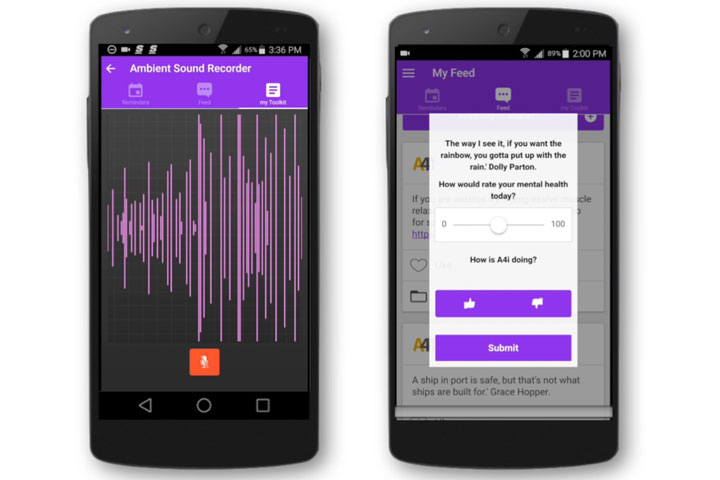Researchers at the Centre for Addiction and Mental Health (CAMH) are hoping that patients who are dealing with psychosis and schizophrenia might soon have a new tool to help manage their illness – their smartphones.

CAMH has partnered with the tech firm MEMOTEXT Corp to develop an app called A4i that includes tools, like a calendar and social media function, that they believe could help to fill the gap in care for schizophrenia, which affects around one per cent of the Canadian population.
Outside of the hospital, there aren’t a lot of community-based care options for people, according to Dr. Sean Kidd, division chief of psychology at CAMH.
“The average person might have an appointment for 20 minutes once a month with a psychiatrist, maybe touch base here and there with a case manager,” he said, but in general support is quite limited.
The idea behind the app is to create a “fairly accessible low-cost way of helping people, of giving people some tools to help better manage their own illness and connect with providers.”
How it works
When someone first fires up the app, they’re asked a number of questions to determine what exactly their concerns are: if they’re experiencing hallucinations, or having trouble remembering things, for example.
Then, every day, they receive a number of text alerts related to their challenges, offering tips and strategies rooted in cognitive behavioural therapy.
For example, said Kidd, many people with schizophrenia feel like it’s hard to get energy and get motivated to leave the house and start their day.

Get weekly health news
“You might get a text that says something along the lines of, ‘Struggling to get going today? Just try those first few steps. Get outside and then figure out what you’ll do next from there.’”
People can also anonymously share coping tips with each other, and a calendar function helps people set reminders for appointments and to take their medication.
“Many people with schizophrenia struggle with retention and memory challenges,” said Kidd.
There’s also a sound detector function, which displays sound waves like an oscilloscope, to help people deal with another common symptom of schizophrenia – auditory hallucinations, or hearing voices.
“Especially when a person is less well and is experiencing this hallucination, it sounds like and it feels like somebody is saying something just as you’re hearing me talk,” said Kidd.
“For many people unfortunately, the voices they hear, and it can be more than one voice, more than one personality coming through, it can be disturbing, threatening, yelling, so kind of scary.”
Having a sound detector can help people determine whether what they’re hearing is a voice in their head or just someone in the apartment next door.
“That helps a person determine what they should do in response to it,” he said, such as whether they need to turn to coping strategies for dealing with voices.
People are also asked daily to rate their mental health and make notes of any issues they’re experiencing. This can be used to generate a report for health care providers.
WATCH: When a loved one is experiencing symptoms of schizophrenia, getting them help fast is critical, but it isn’t always easy. As Heather Yourex-West explains, sometimes families need to turn to the legal system for help.

Research and testing
The app is still two or three years away from being released to the public, said Kidd. The researchers have been rigorously testing the program and getting feedback from doctors and patients, and plan to do a clinical trial of the technology before putting it on the market.
“There are many apps that are out there and there’s not much evidence that they do anything. So we’re trying to make sure that whatever we put in people’s hands is impactful and useful,” he said.
Patient advocate Jesse Bigelow has been consulting with the project, bringing his own experience with schizophrenia to the table. He’s particularly excited about the peer-to-peer counselling and tip-sharing functions. “People are much stronger together, you know what I’m saying? I’ve been in the mental health community for a while and if you see other people doing well and you have people that you can look up to or people that you can rely on, together you’re much stronger than by yourself.”
The app is a “good add-on” to what’s already out there to support people, he said.
“The app, you don’t just use it alone. You still have a place for your psychiatrist, your peer support worker, your social worker, your case manager and whatever.”
So far, he’s liked what he’s seen and has found it helpful. “It helped me to sort of see what the potential an app like this has.”


Comments